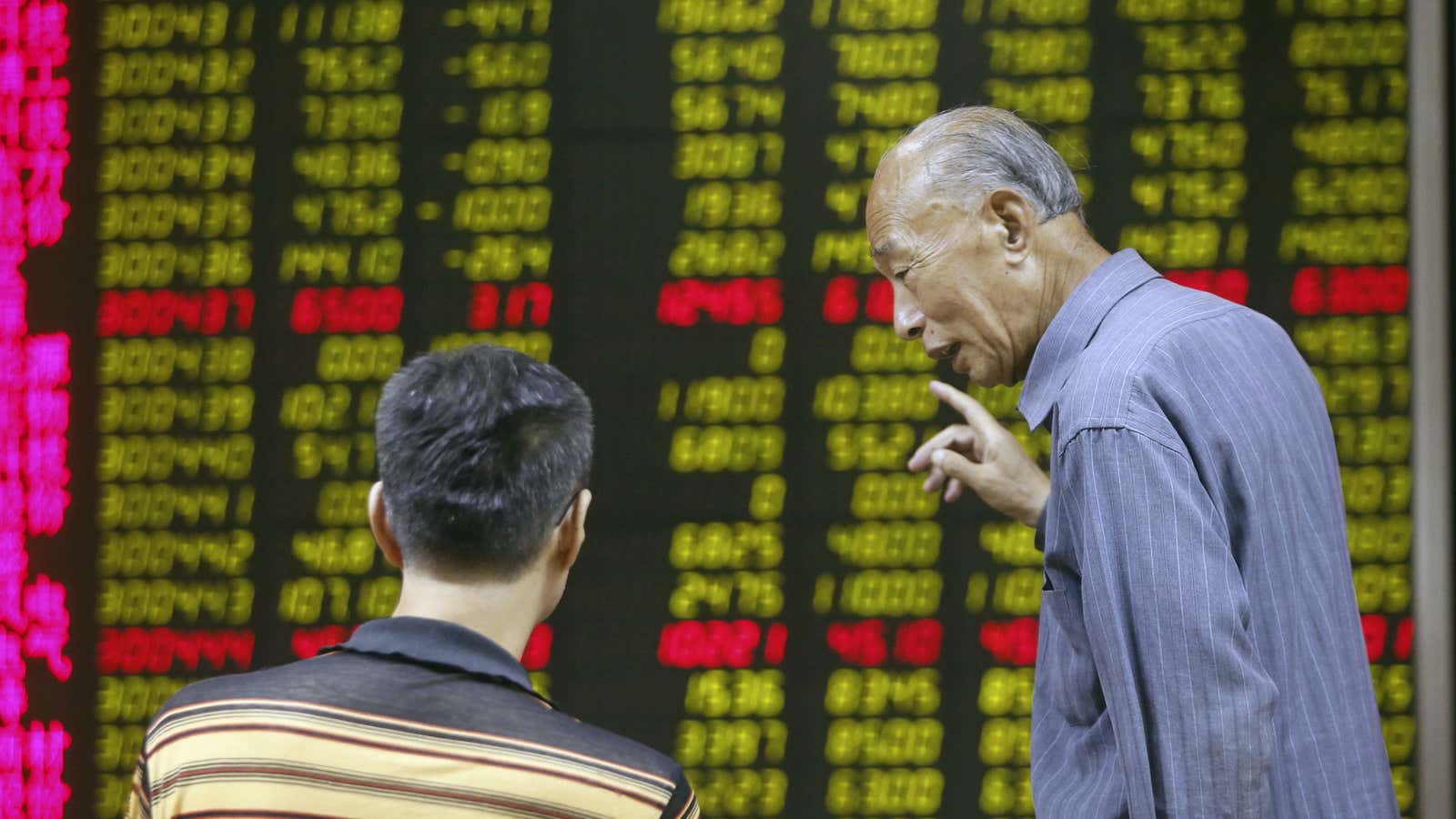China’s stock markets continue to stumble, despite the massive stimulus that the government has unleashed to prop them up. The Shanghai benchmark index fell by 1.23% today (Sep. 1), after closing down slightly yesterday. The index has fallen by nearly 40% from its mid-June peak.
In some ways, the slide isn’t surprising—after all, Chinese stocks were trading at extremely rich valuations before they started to fall, even as signs emerged that China’s economy was slowing.
China’s retail investors poured money into the stock market earlier this year because they didn’t have many other choices (they’re all but barred by Beijing from investing outside the country). The government helped fund the rush to equities by loosening up credit in an attempt to offset a growing bad-debt problem.
Since the markets’ fall, China’s stock prices look much more rational—but government officials have been working overtime to lay the blame for the drastic correction on almost anyone but policymakers in Beijing. These are the main scapegoats so far…
The journalist and the warlord
Wang Xiaolu, a reporter at the respected financial magazine Caijing, confessed on Aug. 31 during a national broadcast on CCTV (link in Chinese) that he had written a report about the stock market “based on hearsay” and “my own subjective guesses.” His lengthy article (link in Chinese), which ran on July 20, examined how poorly the government’s expensive stock market stimulus was working to prop up prices, and predicted, in a paragraph buried deep in the article, that officials could be expected to cut back on this stimulus in the future.
The report “caused panic” in China’s stock markets, the state-run Global Times explained today:
A July 20 report written by Wang claimed that the China Securities Regulatory Commission (CSRC) was considering withdrawing funds from the A-shares market. The CSRC immediately denied the report. The Shanghai index still fell by 8.48 percent on July 27.
“I shouldn’t have published a report that had huge bad influence to the stock market in such a sensitive time, and caused such great losses to the country and stock investors for catching readers’ eyes,” Wang said during his public confession.
The reporter’s confession, and the charges against him, have been criticized both inside China and out. It is particularly puzzling because after Wang’s report was published on July 20, China’s key stock index went up, not down, for several days in a row:
Some suspect CSRC officials themselves may have told Wang to write about the end of stimulus to test how investors would react—a tactic that governments use with journalists around the world.
After all, what Wang predicted has mostly come to pass. During a regulatory meeting last week, the government decided to stop propping up the market with large-scale share purchases, the Financial Times (paywall) reported on Aug. 30, citing anonymous traders and officials at the meeting.
The bizarre charges against Wang led Luo Changping, former vice editor-in-chief at Caijing magazine, to compare the reporter’s detention to a tale from China’s Three Kingdoms period on Weibo (link in Chinese).
During that time, warlord Cao Cao planned to withdraw his troops during a battle, Luo explained, so his adviser Yang Xiu ordered the troops to retreat. The warlord responded by killing the adviser for destroying the troops’ morale, then ordered the troops to retreat himself. Over 3,000 Chinese netizens have shared Luo’s comparison online.
China’s biggest investment bank
CITIC Securities is China’s largest brokerage and the leader in investment banking revenue in the country, beating out Wall Street’s giants and bigger Chinese banks:
A key player in China’s recent IPO boom that helped fuel the stock markets rise, the bank also appears to be a main target of China’s investigation into the market decline. So far, six CITIC Securities employees have been detained for suspected illegal trading, and four top managers, including Xu Gang, former head of the brokerage department and research at the bank, have confessed to insider trading, according to Xinhua.
What these CITIC executives’ specific crimes are, no one knows, although Xinhua reported earlier on market rumors that they “ganged up with foreign hedge funds to short-sell Chinese stocks.” CITIC said its executives are complying with the investigation.
Short-selling Chinese stocks—that is, betting on their decline—is not a crime, but regulators have moved to crack down on so-called “malicious” short-selling in recent weeks.
Hedge funds
Li Yifei, the head of hedge fund Man Group’s operations in China, was taken into police custody to aid an investigation into market volatility, Bloomberg reported Aug. 31. Her husband told Bloomberg she was speaking to the “relevant authorities” and he did not know when she might return.
Citadel Securities, part of US hedge fund Citadel, had one of its trading accounts in China suspended in early August by the securities regulator. The account, which traded shares on the tech-heavy Shenzhen Composite, was run jointly with a local partner.
The US Federal Reserve
China’s market downturn had more to do with the US Federal Reserve’s rumored plan to raise interest rates than it does with any domestic issues, a central bank official recently told Reuters. “China’s exchange rate reform had nothing to do with the global stock market volatility, it was mainly due to the upcoming US Federal Reserve monetary policy move,” Yao Yudong, head of the bank’s Research Institute of Finance and Banking, said.
Online rumors
Chinese police have punished 197 people for spreading what they regarded as online rumors and shut down 165 related accounts, which ”caused panic, misled the public and resulted in disorder,” the public security ministry’s website (link in Chinese) reported on Aug. 30. The ministry has said it is going after rumors about the upcoming WWII victory parade, the stock market, and the recent Tianjin explosions.
